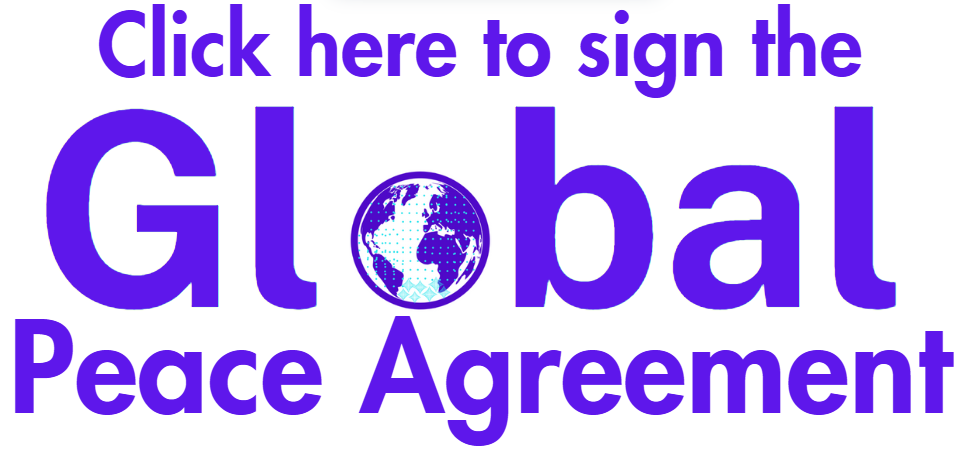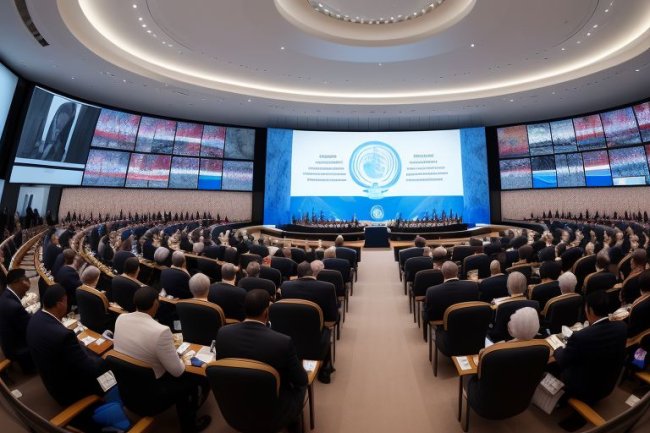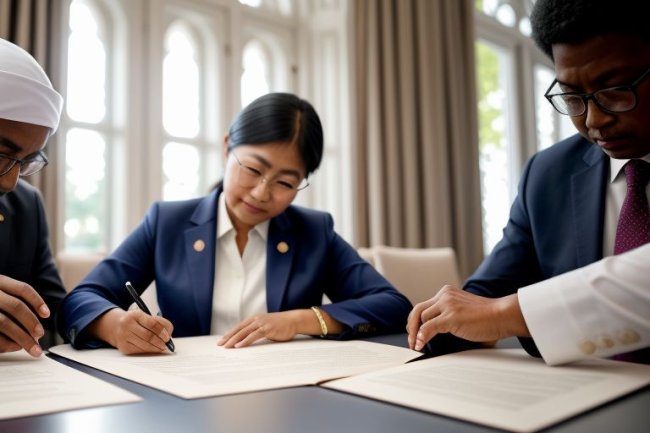A Multilateral Charter for Peace
In a situation where conflicts have long dominated the landscape, the yearning for enduring peace and global harmony resounds deeply within the hearts of individuals and nations alike. As humanity stands at the crossroads of its destiny, a profound realization dawns upon us—that the pursuit of zero tolerance for war, terrorism, and any method of bloodshed is not just a lofty ideal but an imperative for our shared future.

This standard yet compelling aspiration guides us towards a world where swords are transformed into plowshares, nations bridge differences through dialogue and diplomacy, and the sanctity of human life stands inviolable. The quest for lasting peace transcends political boundaries and cultural divides, uniting humanity under a universal banner of hope and progress.
Beyond the clamor of discord, we find common ground—an unyielding commitment to preserving the dignity of life and fostering an environment conducive to mutual understanding. The call to action extends beyond the hallowed halls of governance; it beckons each individual to contribute their part, for peace is not merely a concept but a collective responsibility.
In this pursuit, we are not naive to the complexities that lie ahead. History has taught us harsh lessons but has also illuminated the possibilities that emerge when we prioritize diplomacy over hostility and compassion over conflict. Each step towards peace, no matter how small, resonates with the potential to ripple across borders and transform our world.
This is not a solitary journey but a shared endeavor that bridges nations and transcends generations. It calls upon leaders to rise above political expediency and prioritize the welfare of their people, recognizing that prosperity is best secured in a climate of peace and stability. It implores citizens to embrace diversity and seek dialogue, for prejudices crumble and understanding flourish in the meeting of minds.
Together, we stand on the cusp of a defining moment—an opportunity to mold the future we wish to inherit. Through concerted efforts and unwavering determination, we can rewrite the narrative of our times, scribing a story of unity, compassion, and progress.
Notably, peace is not a destination but a continuous journey—a collective effort to foster a world where the pen is mightier than the sword and the power of cooperation surpasses that of conflict. Let us dare to dream, aspire to inspire, and forge an unbreakable resolve to build a future founded on the principles of zero tolerance for war, terrorism, and any method of bloodshed.
In this chapter, we explore the contours of this vision, delving into the depths of possibility and potential. Together, let us take the first step towards a more peaceful world filled with hope, harmony, and a shared commitment to a brighter tomorrow.
Multilateral Charter for Peace: The Framework for Peaceful Coexistence
The Multilateral Charter for Peace is a visionary document that seeks to foster global harmony and security. At its heart lies a profound commitment to cooperation and collaboration among nations, underpinned by the core principle of zero tolerance for war, terrorism, and any form of bloodshed.
The charter's vision is centered on the belief that through united efforts, nations can transcend their interests and address shared challenges more effectively. It recognizes the interconnected nature of contemporary global issues, understanding that no single country can navigate the complexities of the modern world in isolation.
The principle of zero tolerance for war, terrorism, and bloodshed is a resolute call to action against violence as a means of resolving conflicts. The charter acknowledges the devastating consequences of armed conflicts on human lives, infrastructure, and societal well-being. It underscores the urgency to seek peaceful alternatives to address disputes and disagreements among nations.
Diplomacy emerges as the keystone for conflict resolution within the multilateral charter. The charter seeks to build bridges of understanding and trust through diplomatic dialogue, negotiations, and mediation. It emphasizes that genuine strength lies not in military prowess but in the ability to communicate openly and honestly.
As nations unite in their commitment to combat terrorism, violent extremism, and the proliferation of weapons of mass destruction, collective security transforms into a shared responsibility. In the context of the charter, it is acknowledged that genuine security can only be achieved when all nations actively participate in safeguarding the safety and stability of the global community. This emphasizes the imperative for collaborative efforts among countries, underscoring the need to work together to address security challenges effectively.
While promoting cooperation, the multilateral charter also respects the sovereignty and independence of each nation. It celebrates the diversity of cultures and experiences, seeking to create an inclusive global community where mutual respect prevails. The charter aims to dismantle barriers that divide nations, promoting dialogue and understanding.
Integral to the charter's vision is integrating sustainable development as a core component. Peace and development are seen as mutually reinforcing, and nations are encouraged to prioritize responsible resource management, environmental protection, and social progress.
To cultivate a lasting culture of peace, the charter places significant emphasis on education and empathy. The charter seeks to build understanding and compassion among nations by promoting global citizenship and cultural exchange. Education becomes a powerful tool to nurture critical thinking and open-mindedness, shaping a new generation of leaders committed to peace and cooperation.
The Multilateral Charter for Peace represents a transformative initiative that envisions a world united through cooperation and collaboration. By embracing zero tolerance for war, terrorism, and bloodshed, nations take a decisive step toward fostering global harmony and security. The charter calls upon all nations to work together for mutual understanding, trust, and sustainable development. As nations commit to the ideals of the multilateral charter, a brighter future emerges—a future where diplomacy and empathy triumph over conflict and violence, paving the way for a more peaceful and prosperous world for all humanity.
Upholding Sovereignty: A Pivotal Principle for Harmonious International Relations
Recognizing and respecting each nation's sovereignty becomes critical in the quest for harmonious international relations and peaceful cohabitation. It is the foundation for building international trust, collaboration, and understanding. By recognizing states' sovereignty and independence, the global community may foster an atmosphere in which subnational and national governments agree to zero tolerance for war, terrorism, and other forms of crime.
Recognizing and respecting sovereignty stands as a cornerstone of modern international relations. It embodies the notion that each nation possesses the inherent right to govern its internal and external affairs without external interference. This principle is enshrined in the Charter of the United Nations and is integral to the fabric of international law.
In recognizing sovereignty, nations extend mutual respect to one another, acknowledging that no single nation has the right to dictate the internal affairs of another. It lays the groundwork for cooperation and collaboration as nations seek to dialogue and find common ground to address shared challenges.
Respecting sovereignty does not imply isolation or exclusion but emphasizes the importance of sovereign equality. It encourages nations to interact as equals, understanding that diverse perspectives and experiences enrich the global discourse. Embracing this principle enables a more inclusive and just international order where nations can forge partnerships based on mutual interests and aspirations.
When Subnational and national governments commit to recognizing and respecting each other's sovereignty, they lay a solid foundation for building trust and enhancing diplomatic relations. Diplomacy, as the primary means for conflict resolution, becomes more effective in an atmosphere of respect and equality. Nations can engage in open and constructive dialogue, mitigating misunderstandings and dispelling mistrust.
Sovereign nations have the prerogative to determine their domestic policies and governance structures, provided they adhere to international law and norms. This recognition empowers nations to implement policies that promote social progress, human rights, and economic development tailored to their unique circumstances.
In promoting harmonious relations, the sovereignty principle allows nations to unite to pursue common goals. Nations can collaborate on issues of global significance, such as climate change, pandemics, and poverty, recognizing that these challenges transcend borders and demand collective action.
Moreover, recognizing sovereignty enhances the efficacy of multilateral institutions and agreements. When nations voluntarily participate in international treaties and organizations, they affirm their commitment to resolving global issues through collective efforts. This cooperation strengthens the global governance system and reinforces the rule of law.
Central to the principle of sovereignty is the respect for territorial integrity. Borders serve as the physical manifestation of a nation's sovereignty, and any attempts to violate these borders are perceived as a threat to national security. By upholding territorial integrity, nations contribute to regional stability and prevent conflicts rooted in territorial disputes.
In this context, zero tolerance for war, terrorism, and any method of bloodshed gains even greater significance. Embracing this principle becomes imperative for protecting the sovereignty of nations and ensuring their peaceful coexistence. Armed conflicts and acts of terrorism undermine the autonomy of nations and disrupt the lives of innocent civilians, impeding social progress and development.
When Subnational and national governments commit to zero tolerance for conflict, they prioritize peaceful solutions to disputes and disagreements. They pledge to exhaust diplomatic means in resolving conflicts, seeking dialogue, mediation, and arbitration as the preferred alternatives. Doing so reinforces the principle of recognizing and respecting sovereignty, as peaceful resolution preserves the dignity and autonomy of the nations involved.
Zero tolerance for war, terrorism, and any method of bloodshed transcends national boundaries. It requires nations to cooperate in combating transnational threats that endanger global security. Terrorism, being unbounded by borders, necessitates a unified response from the international community to counter its impact effectively.
Additionally, zero tolerance for conflict enhances the potential for economic development and prosperity. Nations at peace can allocate resources to social welfare, education, and infrastructure, uplifting their citizens' quality of life. Stability and security attract foreign investment and foster economic partnerships, further promoting global cooperation.
Recognizing and respecting the sovereignty of each nation stands as a fundamental principle in promoting harmonious relations and peaceful coexistence. This principle creates a framework where Subnational and national governments can agree to zero tolerance for war, terrorism, and any method of bloodshed. By acknowledging the autonomy and equality of nations, the global community can forge an environment where diplomatic dialogue thrives and peaceful conflict resolution prevails. Upholding sovereignty reinforces the rule of law and enhances the effectiveness of international cooperation. Together, with an unwavering commitment to zero tolerance for conflict, nations can pave the way for a future of global harmony, security, and shared prosperity.




















